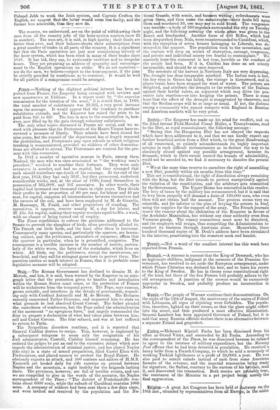Maly, — The Roman Government has declined to dismiss M. de Merode,
and has, it is said, been warned by the Emperor in an auto- graph letter that the protection given to bandits and incendiaries within the Roman States- must cease, or the protection of France will be withdrawn from the temporal power. The Pope, says rumour, i grows irritable, and interferes in the details of government, consult- ing only with Cardinal Antonelli and M. de Merode. His Holiness recently summoned Father Giacomo, and requested him to state on what grounds be had absolved Count Cavour. The father pleaded the sacredness of confession, but the Pope called the administration of the sacrament " an egregious farce," and angrily commanded the friar to prepare a declaration of what had taken place between him- self and Count Cavour. The friar refused, and was at last suffered to return to Turin.
The Neapolitan disorders continue, and it is reported that General Cialdini desires to resign. This, however, is explained by 4). subsequent telegram to mean only the resignation of his cavil administrator, Cantelli, Cialdini himself remaining. He has ordered the judges to put an end to the excessive delays which now impede the administration of criminal justice, and has placed Naples (the city) in a state of armed preparation, filled Castel Elmo with Piedmontese, and placed cannon to protect the Royal Palace. He obviously expects an attack, and 500 marines and sailors of H.M.S. Exmouth are landed daily for rifle exercise on ground between Naples and the mountain, a sight healthy for the brigands lurking there. The provinces, however, are full of terrible events, and one we are compelled to give in the words of the narrator, the Naples correspondent of the Times: "The district of Pontelandolfo con- tains about 6000 souls, while the suburb of Casalduni contains 1000 more. A company of soldiers had been sent there a few days since, and were invited and received by the population and the Na- tional Guards, with music, and banners wavina.; refreshments were given them, and then came the catastrophe—their hosts fell upon them and murdered 39, one may say in cold blood. The vengeance was terrible—a body of 500,regulars surrounded the city on Tuesday night, and the following morning the whole place was given to the flames and bombarded. Another force of 400 Rifles, which had been despatched from Nola, were countermanded to Casalduni, which, with the exception of seven houses belonging to Liberals, was de- stroyed in like manner. The population took to the mountains, and the curtain will drop on scenes of starvation, carnage, vengeance, and private and individmil misery too fearful to contemplate." We sincerely hope this statement is not true, horrible as the conduct of the people had been. If it is, Cialdini has done an act utterly inexcusable, and should be at once removed.
The accounts of the harvest in Northern Italy are very depressing, The drought has done irreparable mischief. The Indian corn is lost, the hay crop in Genoa has failed, the vintage is threatened, and in places trains have been stopped for want of water. The priests are delighted, and attribute the drought to the rebellion of the Italians against their lawful rulers, an argument which may drive the pea- santry into reaction—or into hanging the priests. There is some hope that the effect of the drought is exaggerated by observers, and that the Sicilian crops will be as large as usual. If not, the distress among a community who cannot compete with England in Russian and American markets will be very great.






























 Previous page
Previous page